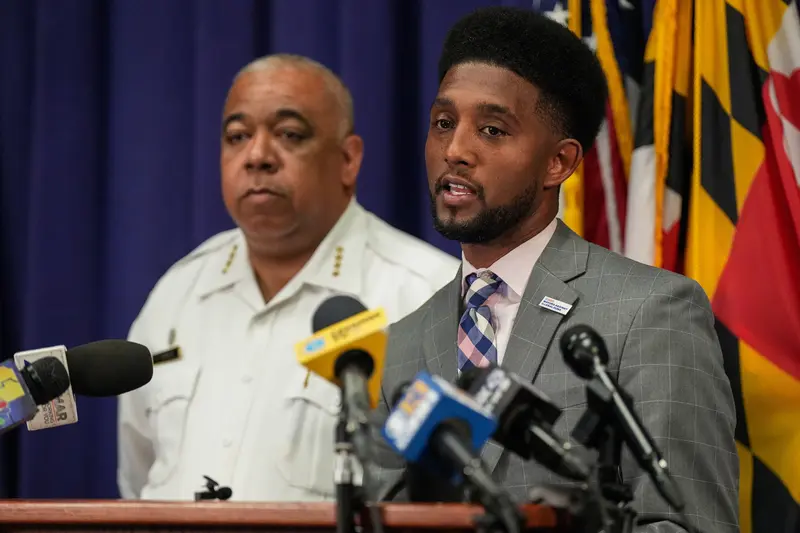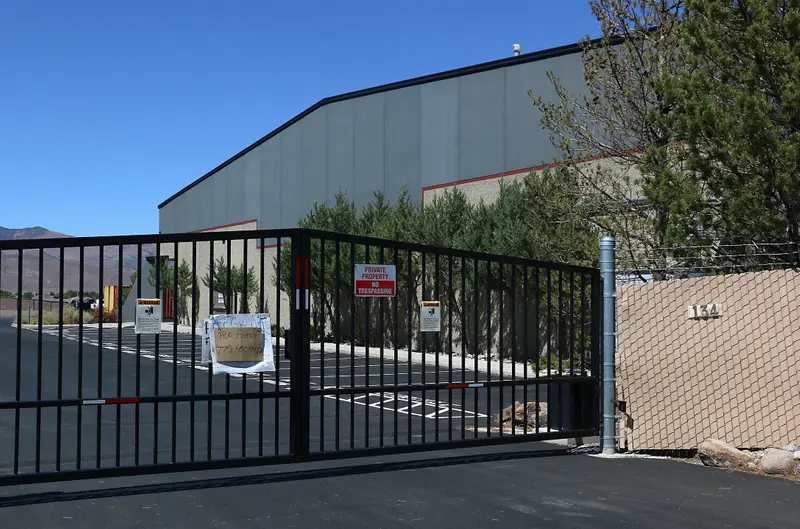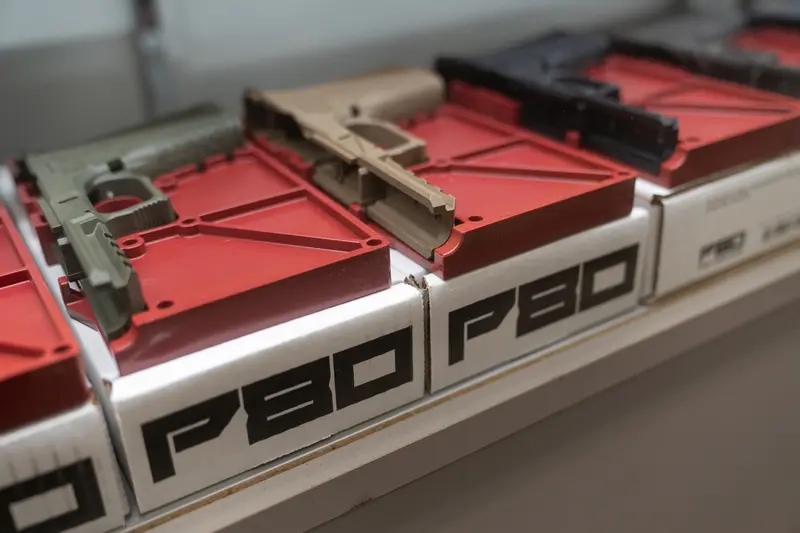This story was co-published with The Baltimore Banner and Reno Gazette Journal.
As Nevada lawmakers heard public comment last year on a bill to ban ghost guns and the parts used to make them, a resident of the rural town of Dayton called into the hearing to offer his opinion. The privately made firearms are virtually untraceable because they lack a serial number and can be easily purchased online and assembled by people who otherwise wouldn’t be able to legally buy a gun.
“I do not care if this bill passes or not,” said the man, who identified himself only as Loran Kelley. “I am just informing you that we, as Americans, just will not comply with it no matter what you do.”
What he didn’t mention to the committee is that he owns a company called Polymer80, one of the country’s most prolific manufacturers of ghost gun kits and parts. His vow to defy such regulations is as much about principle as profit, even as thousands of untraceable guns bearing the P80 stamp have turned up at crime scenes from Los Angeles to Baltimore.
According to court documents, the vast majority of ghost guns recovered by law enforcement nationwide are built from Polymer80 parts. That’s why Nevada lawmakers were debating the bill: Anti-gun violence advocates saw a unique opportunity to shut down the flow of ghost gun parts to the rest of the country by going after the source.
“You can say you can’t possess an unserialized gun, but you need to be able to go up the supply chain if you want to stop this problem,” said David Pucino, deputy chief counsel for Giffords Law Center, who helped draft the Nevada legislation.
Nevada’s effort came as big city mayors across the country were beginning to grapple with an increase in crimes committed with Polymer80 guns. A handful of states had passed legislation restricting ghost guns. Washington, D.C., and Los Angeles had sued Polymer80, claiming the company was selling a product that violated their local gun control laws. And an additional four cities had sued the Bureau of Alcohol, Tobacco, Firearms and Explosives, seeking to compel the agency to require manufacturers like Polymer80 to put serial numbers on core ghost gun components.
Advocates viewed the Nevada law as a potentially more effective tactic than the patchwork of efforts brought to bear so far.
And it almost worked.
The Legislature passed Assembly Bill 286 on a party-line vote in May 2021. In seven months, when the new law took effect, Polymer80 would be out of the ghost gun kit-making business. At least in Nevada.
But thanks to a strategically chosen court venue in rural Nevada and with the help of the New York law firm Greenspoon Marder, Polymer80 won a decision vacating the section of law that would have halted its ghost gun business. While it is now illegal to assemble or possess a ghost gun in Nevada, it remains legal to possess and transport the components of a ghost gun.
As a result, the parts that some use to evade gun-control laws and others use to pursue their hobby of homemade gunmaking continue to flow from Polymer80 to the rest of the country.
Anti-gun violence advocates say their court defeat in Nevada underlines the weakness of a state-by-state approach to closing the ghost gun loophole. They also noted that the bipartisan federal gun bill signed into law in June in response to a spate of mass shootings does nothing to address the problem of ghost guns.
“The state level laws are really important but can only go so far,” Pucino said. “Really we need a federal solution.”
Kelley, who doesn’t trust the news media, rarely talks to reporters, despite his company’s increasingly high profile. But in an hourlong interview with ProPublica, Kelley described his remarks to lawmakers last year as “political grandstanding” and not a promise to break the ghost gun law. Still, it was a moment that portended Kelley’s victory in court.
“I was pointing out a simple fact, ‘You can do whatever you want, but it’s not going to work,’” Kelley said. “And I was proven to be right.”
But Polymer80’s victory in the Nevada court does not obviate the legal threat it faces elsewhere, including lawsuits from big-city mayors trying to stem gun violence on their streets and a pair of deputies ambushed in their patrol car by an assailant wielding a Polymer80 ghost gun.
It’s a position that Kelley both relishes and resents. If it were up to him, he said, he’d focus on building his business and looking after his 50 or so employees. But he doesn’t shy away from a fight over his principles.
“Polymer80 is on the front lines of protecting the Second Amendment rights of all Americans right now,” Kelley told ProPublica. “That’s not a brag. It’s just the reality because we’ve become the whipping boy for emotionally driven government policy.”

Baltimore Mayor Brandon Scott is one of the city leaders who has sued Polymer80. The lawsuit is intended to hold the company accountable for the street violence perpetrated by people using Polymer80 kits to circumvent federal and state gun laws that require a background check to purchase a firearm and a license to own a handgun. Maryland law also prohibits the sale and manufacture of guns that aren’t included on the state’s handgun roster, which does not list those built with Polymer80 parts.
Scott said he first heard about ghost guns in 2018, when, as a City Council member, he was chair of the Public Safety Committee. That year, law enforcement confiscated nine unserialized firearms. Within three years, police were confiscating hundreds of the illegal weapons annually.
“Once they arrived, they became a huge problem for us,” Scott told ProPublica. “They’ve been used in shootings, robberies, carjackings, murder. We’re seeing them run the gamut.”
Baltimore police recently busted a ghost gun-making operation, arresting a man who had dozens of Polymer80 kits, Scott said. The man was a childhood friend of Scott’s.
But another incident made the issue even more personal for Scott. In January 2021, Dante Barksdale, an anti-violence activist beloved in Baltimore was shot nine times with a Polymer80 ghost gun. He died in the courtyard of an apartment building where he had a few weeks earlier delivered winter coats to families who live there.
“Dante was like a brother to me,” Scott said. “His death really impacts everything that I do in the realm of public safety. If he were here today — he’s probably in the room with me right now — he would say, ‘You gotta go after the gun companies, too.’”
The rise of ghost gun crimes on Baltimore’s streets coincides with the growth of Polymer80’s business.
Kelley founded Polymer80 in 2013 with his father, Loran Kelley Sr., and their business partner David Borges, who recently retired from the company. Kelley’s father died in January. Polymer80 got its start in Vacaville, California. But Nevada, with its low taxes and friendly regulatory environment, beckoned, and the company moved here a year later.
In 2016, Polymer80 became a licensed firearm manufacturer, allowing it to produce traditional firearms that comply with the Federal Gun Control Act. But the larger part of its business is the production of so-called unfinished frames, the lower part of a handgun, including the pistol grip and trigger guard, onto which the firing mechanism and related components are fitted. The company also makes unfinished receivers, the base component of a rifle, such as an AR-15.
Federal law requires completed frames and receivers to be stamped with serial numbers. To avoid that requirement, Polymer80 designed “unfinished” frames, which are about 80% complete. The frame and remaining components can easily be assembled into a functioning firearm. In 2015, Polymer80 began sending samples of its unfinished frames to the ATF, which agreed the part did not require a serial number.
“Our strategy always has been to be very open and candid with the ATF and the government,” Kelley said. “We’ve always been proactive with sending the ATF information on our products and we just operate above board.”
Business took off. Between January 2019 and October 2020, for example, Polymer80 shipped nearly 52,000 items to customers across the country, according to court documents.
But as Polymer80 grew, so did the number of privately assembled firearms police were recovering at crime scenes. Just as Baltimore experienced an increase in ghost gun recoveries starting in 2016, so too did Washington, D.C., and Los Angeles. Nationally, according to ATF published numbers, the number of ghost guns recovered by law enforcement jumped to 19,344 in 2021 from 1,758 in 2016. The vast majority of those guns were assembled with Polymer80 parts, according to court documents.
Ghost guns haven’t been involved in the latest high profile mass shootings, such as in Uvalde, Texas; Highland Park, Illinois; or Buffalo, New York, which each involved legally obtained AR-15-style weapons. But mayors in the cities that have either sued Polymer80 or asked the ATF to close its ghost gun loophole — Washington, D.C., Baltimore, Los Angeles, New York — argue they’re increasingly common in street violence. Ghost guns have been used in school shootings by teenagers too young to legally buy firearms in New Mexico, Arizona, Maryland and California. In 2020, two Los Angeles County deputies sitting in their patrol car were shot — one in the face, one in the arm — by a man with a ghost gun. Both survived but sustained grievous injuries. A lawsuit they filed against Polymer80 is pending in Los Angeles County Superior Court, as is the lawsuit filed by the city of Los Angeles on behalf of the people of California.
Although the ATF gave Polymer80 the go-ahead to sell unfinished frames without serial numbers, the company started to market a kit — called Buy, Build, Shoot — that included both the unfinished frame and other parts needed to quickly assemble a complete firearm. The ATF never gave Polymer80 explicit approval to sell these complete kits without complying with serial number and background check requirements.
Pucino, the deputy chief counsel for Giffords Law Center, said Polymer80 is exploiting loopholes to enable its customers to evade gun control laws, including age requirements for gun purchases.
“Their whole business model, which makes them different from, say, Glock, is they evade restrictions,” he said.
In late 2020, investigators with the ATF concluded that Polymer80’s kits likely violated the Federal Gun Control Act and launched a raid on the Dayton manufacturing plant in December 2020. According to the search warrant affidavit, investigators found evidence Polymer80 shipped gun parts to individuals whose criminal backgrounds prohibit them from owning firearms and to individuals in foreign countries. (Polymer80’s website previously said the company has “a strict policy against selling 80% lower receivers to persons known to us to be convicted felons or otherwise prohibited persons.” That language was recently removed.)

Although the affidavit was made public, the federal court has resealed the case, meaning the results of the raid and any subsequent actions aren’t public. ATF spokesperson Ginger Colbrun said she couldn’t comment on the case because the investigation remains active.
Kelley wouldn’t comment on the specifics of the ATF investigation, but he pointed to the fact no one from his company has been arrested following the raid as an indication Polymer80 hasn’t broken the law.
“We are still talking to them about that,” he said. “We have a positive set of conversations going on.”
Kelley vehemently disagrees with the assertion his company tries to exploit loopholes, saying the company does nothing but comply with the law. He describes his customers as hobbyists and homemade-gun enthusiasts engaging in a centuries-old practice of building their own firearms.
“Polymer80 has always been a law-abiding company and always will be,” he said, noting it hasn’t sold any ghost gun parts to Nevadans since the 2021 law — which still prohibits possessing a complete ghost gun. “What’s going on is people in power realizing people have always had a right to do this and they don’t like it.”
Polymer80 wants to succeed through legal means, Kelley said. That wouldn’t be possible if all his customers were criminals.
“It would be a really, really stupid business model to cater specifically to criminals, and I would find such a practice to be deplorable,” he said.
It’s not hobbyists using Polymer80 guns on the streets of Baltimore, Scott said.
“That is the most ludicrous thing and ridiculous thing I’ve ever heard,” Scott said. “Their business model explicitly targets purchasers seeking to evade law enforcement or who can’t obtain a gun from a licensed dealer.”
After the 2021 ghost gun law passed in Nevada, Polymer80 hired the New York City law firm Greenspoon Marder to file the lawsuit in Yerington, an onion farming town that’s the seat of the county that’s home to Polymer80. One of the firm’s managing partners, James McGuire, traveled to Yerington to argue before Judge John Schlegelmilch that the law was written so vaguely it would be impossible to enforce and would be ripe for abuse.
McGuire said in an email he no longer represents Polymer80 and referred questions to another lawyer at the firm, who didn’t respond to requests for comment.
In court, McGuire argued the law failed to define key terms such as “receiver” and “frame,” and used “murky and undefined terms” to explain what an “unfinished receiver” is. He also argued the law doesn’t specify when in the manufacturing process an unfinished receiver actually becomes a receiver.
During two hearings on the lawsuit, Schlegelmilch seemed to have little patience with the state’s argument that the law relies on industry-specific terms that are well understood by Polymer80. Instead the judge agreed with McGuire that the law didn’t adequately define an unfinished receiver. At one point he asked whether his 5-year-old’s rubber band gun could be considered an unfinished receiver simply because it looks like a gun.
“What if I’m at home, and I’m machining a piece of wood. OK? And my 5-year-old wants a rubber band gun. OK? So, I take that piece of wood, I turn it, I make it into — you know, I take a band saw, and I cut out what looks like a firearm. And I put a couple of sticks on it so that you can put a rubber band on it when you push it up. You’ve seen a rubber band gun before, right? So, is that mostly completed?”
“I mean, a rubber band gun’s not a firearm,” responded the state’s attorney, Greg Zunino. “I don't think you would ever be prosecuted under that scenario because you still have to have an intent to turn something into a firearm.”
Schlegelmilch ruled in favor of Polymer80 and enjoined the state from enforcing the section of the law that prohibited the possession and sale of unfinished frames and receivers. Schlegelmilch let stand the rest of the law, which Polymer80 didn’t challenge and prohibits the possession of a completed ghost gun.
The state has appealed Schlegelmilch’s ruling to the Nevada Supreme Court.
Schlegelmilch declined an interview request because the appeal is pending.
Kelley declined to comment on the decision to file the lawsuit on his home turf in Lyon County.
Other courts have ruled differently.
A similar lawsuit filed in federal court in Reno the same month was quickly tossed by a judge who decided the law “is a valid exercise of the government’s police power.”
“What happened here, with the state court being more successful for them, indicates politics and ideology within the judiciary,” Pucino said.
This month, a judge in Washington, D.C., found Polymer80 sold illegal firearms in the district and ordered it to pay $4 million in penalties.
The ATF is also seeking to impose a new rule that would require unfinished receivers and frames to include a serial number — one of the federal strategies that Pucino said would be more effective than a state-by-state approach. The new rule, seen as a way to close the ghost gun loophole, is set to take effect on Aug. 24, but it faces at least three lawsuits from the ghost gun industry seeking to block its implementation.
McGuire, the lawyer who represented Polymer80, authored a 27-page public comment submission on the new rule arguing, in part, that it’s impermissibly vague, the same argument that he used successfully to stop the Nevada law.
To some, there’s an easy solution: Polymer80 could stamp serial numbers on the unfinished frames and receivers they sell.
Kelley said putting a serial number on his products wouldn’t hurt his company. But using those numbers to require background checks is a “critical threat” to his business, which he said relies on a growing market of individuals who “value their Fourth Amendment rights” to privacy.
“There’s a problem when people’s right to privacy is infringed and a government agency is looking at what you bought whenever they want,” he said.

















